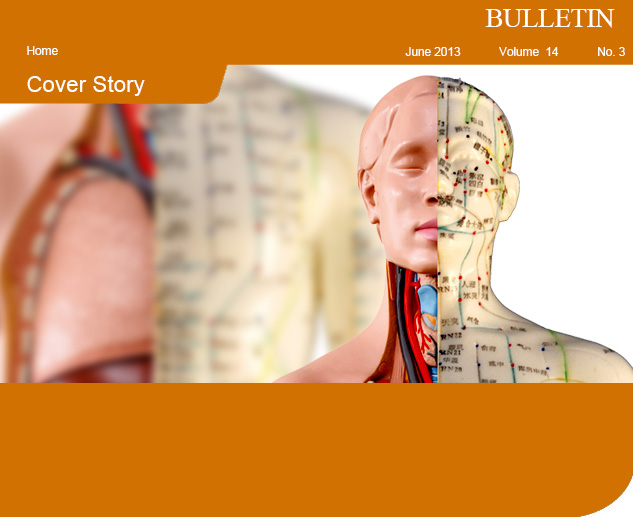
|
|
“Traditional Chinese medicine has its own glossary of terms, its own theoretical basis for deduction of diagnosis, and it arrives at different rationales on how to prescribe and take care of patients. To blend this with modern anatomy, biology and all we’ve discovered in the last few decades – that is not easy.” |
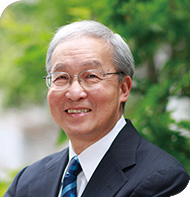 |
||
| Professor Lee Sum-ping |
The best way to understand how traditional Chinese medicine (TCM) and modern Western-style medicine differ is to start with the patient experience. If a young woman and an elderly man living in separate parts of the world visit Western-trained doctors complaining of a cough, they will be offered the same, standardised treatment based on the nature of their cough. But if they visit TCM practitioners, their treatment will be tailored not only to their cough, but their gender and age, climate, time of year, geographic location and other individualised factors. Moreover, the medicine prescribed by the modern doctors will have undergone rigorous testing in laboratories and clinics to prove that it works, while the Chinese medicine will have been formulated from texts and teachings that, although used for more than 2,000 years, have not been so thoroughly analysed. Building a bridge between these two poles is one of the great challenges of 21st century medicine, as HKU’s Dean of Medicine, Professor Lee Sum-ping, Dexter HC Man Family Professor in Medical Science, related. “To completely merge and rationalise these two schools of thought is like blending two religions and saying this god is a god and that god is a god and they are both the same god. That is a very difficult thing to do and the road is paved with a great number of barriers and difficulties. But it is something that has to be done,” he said. And HKU is perhaps the best place for doing it. HKU’s researchers are steeped in Western scientific know-how and familiar with the cultures and traditions associated with Chinese medicine. They have strong English-language skills, which are important for international collaboration. The highly-regarded Faculty of Medicine offers both Western and Chinese medicine as independent yet complementary disciplines. And they are working in a city that recognises and regulates both forms of practice. “Nowhere else has the ability to bring the two together like we do. Not Taiwan, not Korea, not Japan, not even Mainland China because there the two streams are mixed. Only in Hong Kong do you have Western medicine and Chinese medicine regulated separately, independently and yet simultaneously,” Professor Lee said. In order for a merging to happen, there has to be a sympathetic environment and also an appreciation that each approach is more than the sum of its parts, representing not only a unique style of medical care but also a philosophical outlook. |
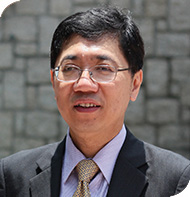 Professor Che Chi-ming Professor Che Chi-ming |
Putting TCM to the test
The sympathetic environment has been an easy thing to provide at HKU. Scholars in several fields are ardently pursuing TCM research because they believe in TCM’s merits, as well as its scientific possibilities. Professor Che Chi-ming, who is Hui Wai Haan Chair of Chemistry and one of the top researchers in his field globally, is one such scholar. “Doing TCM research is my interest, I won’t say it’s just my responsibility. I personally believe in TCM and I want to make some contributions. I’m very optimistic that it has a future,” he said. The Department of Chemistry is one of several units in the University doing TCM research. The School of Biological Sciences, School of |
|
Chinese Medicine and several departments within the Faculty of
Medicine are also applying advanced technologies and methods to study TCM treatments from bench to bedside and back again so as to understand how they work, improve quality and derive new drugs.
Some examples of their outcomes include isolating a compound that has anti-cancer properties, showing how a herbal medicine can improve blood-flow to the brain in post-stroke patients, testing TCM drugs that manage symptoms of menopause and applying acupuncture to alleviate depression and insomnia. HKU also advances TCM research on the international stage as Founder and Secretariat of the Consortium for Globalization of Chinese Medicine, which promotes international research and collaboration and has more than 120 institutional members from around the world. But putting TCM under the microscope is not the same as understanding it. TCM is as much a philosophy and cultural phenomenon as it is a collection of medical components. |
|
“In Chinese medicine you treat patients, not a disease or pathology. I think that’s where it has wisdom.” |
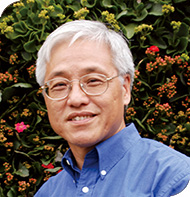 |
||
| Professor Paul Tam |
|
Uncovering the wisdom behind the philosophy “To test a compound is an easy thing,” Professor Lee said. “Within one or two decades a number of medicinal preparations will have marched through the multi-step sequential process of extraction, of purification, of structural identification, of looking at the safety, the potential therapeutic effect and the evidence that it works in humans.” “But to truly understand Chinese medicine takes much work. The more profound and more challenging issue is the principle and theory of practice. TCM has its own glossary of terms, its own theoretical basis for deduction of diagnosis, and it arrives at different rationales on how to prescribe and take care of patients. To blend this with modern anatomy, biology and all we’ve discovered in the last few decades – that is not easy.” TCM concepts such as homeostasis (balance within the body), qi (energy flow), yin and yang, and hot and cold, are unknown in Western medicine. What’s more, the ancient texts describe things that have no modern scientific counterpart. Acupuncture points do not correspond to blood vessels or nerve pathways, and meaning attached to body parts such as the liver and kidney differ from modern anatomy. Herbal remedies, while seemingly more straightforward, number in the tens of thousands and can be enormously complex to examine even with today’s technologies. Professor Lee equated the philosophy of TCM to the pyramids of ancient Egypt. Exactly how they were built and laid out remains a mystery because “they didn’t record what they knew in a language we use today. It is almost like an archaeology of the mind to try to understand the breadth and evolution of that wisdom”. Yet the wisdom cannot be denied, said Professor Paul Tam, Li Shu-Pui Professor in Surgery, Pro-Vice-Chancellor and Vice-President (Research) at HKU who is also a paediatrician. “In Chinese medicine you treat patients, not a disease or pathology. I think that’s where it has wisdom. It aims to restore the health of the individual, although it has some way to go to prove it is effective in a scientific manner.” Improving understanding Scientific proof is not the only issue for TCM. The unknown can breed mistrust, leading some Western doctors to warn their patients off TCM as unproven, and some TCM doctors to argue their centuries-old remedies are more trustworthy than modern treatments such as surgery. HKU therefore is also trying to promote mutual understanding and enrichment by going beyond the laboratory and making an impact in education and clinical settings, too. Students in Medicine, Nursing and Pharmacy learn about TCM and its humanistic spirit and students in Chinese Medicine learn about modern evidence-based medicine. The Faculty also plans to be the first in Hong Kong to offer both Western and Chinese medicine to in-patients at its newly approved hospital, which will open in four years. Patients will be able to be treated by doctors of both traditions. “People say to me, this must be difficult. And I say, yes – that’s why we are doing it first! There has to be a pioneer. This is a good thing for the patient. If your passion is to make patients feel better, then you would use all the knowledge and wisdom available to help them,” Professor Lee said. |
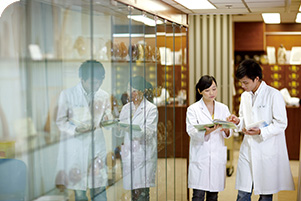 The teaching and learning of Chinese and Western medicine at HKU is complementary – while students in Medicine, Nursing and Pharmacy learn about traditional Chinese medicine and its humanistic spirit, students in Chinese Medicine learn about modern evidence-based medicine. The teaching and learning of Chinese and Western medicine at HKU is complementary – while students in Medicine, Nursing and Pharmacy learn about traditional Chinese medicine and its humanistic spirit, students in Chinese Medicine learn about modern evidence-based medicine.
|
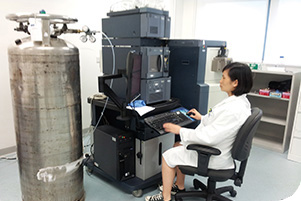 Application of advanced technologies facilitates the study of traditional Chinese medicine at HKU. The Department of Chemistry uses high performance liquid chromatography–tandem mass spectrometry (quadrupole time-of-flight) for chemical analysis of Chinese medicines and drug discovery. Application of advanced technologies facilitates the study of traditional Chinese medicine at HKU. The Department of Chemistry uses high performance liquid chromatography–tandem mass spectrometry (quadrupole time-of-flight) for chemical analysis of Chinese medicines and drug discovery. |
||
|
Moving closer together The goal of merging the two traditions may be getting a little easier because they are inching closer together. As more TCM is tested and analysed with modern technologies, modern scientists are starting to appreciate its merits, particularly as a complementary adjunct to Western medicine. Philosophically, Western medicine is moving towards the more personalised approach that is at the heart of TCM, through such things as gene sequencing. “There is a saying that a good doctor treats your symptoms but the best doctor takes care of your health before you get sick. That is the principle of Chinese medicine. The emphasis is on prevention and this is what modern medicine is coming to recognise,” Professor Lee said. “I think the next frontier in the evolution of medicine will be the modernisation of Chinese medicine. The rediscovery and the re-examination of our past will yield a wonderful outcome for our future.” With a foot in both worlds, the University is best placed to forge this integrated medicine of East and West and promote the best treatment for patients. |
|
Yields from science “TCM is like a gold mine that we can explore with our current scientific methods. These are very exciting times,” said Professor Lee Sum-ping, summing up the enthusiasm felt by both medical and scientific researchers on campus. Professor Che Chi-ming, began looking at Chinese medicine a decade ago when he led an Area of Excellence project on drug development that ultimately resulted in the discovery of a new class of saponin compounds. He and his colleagues in Chemistry, such as Morningside Professor in Chemical Biology, Professor Dan Yang, and Professor Pauline Chiu, are continuing to apply chemistry to Chinese medicine to develop new drugs, analyse herbs to ascertain their authenticity and safety, and investigate their chemical biology to understand their mechanisms of action. They are also working closely with the Faculty of Medicine to translate discoveries to patients. “In interdisciplinary research, you need the strong and the strong to come together if you want to succeed. The Medical Faculty is good at animal models and clinical trials, and Chemistry is strong in basic research, particularly at the molecular level. Bringing this complementary and diverse expertise together is the way to go in Chinese medicine research,” Professor Che said. Meanwhile, the Molecular Chinese Medicine Laboratory in the Faculty of Medicine is using a modern pharmacological approach to devise new drugs from Chinese medicine, including two formulations for which clinical trials are being planned. The School of Chinese Medicine is also active in studying TCM treatments, as are other departments in the Faculty such as Psychiatry, which has studied acupuncture to treat insomnia. The School of Biological Sciences has, among other things, tested the TCM theory of ‘hot and cold constitutions’ of patients through genetic profiling, and identified a pathway involved in energy and heat production. Dr Jennifer Wan, who conducted the study, said “recent technology allows us to identify patterns and syndromes of TCM in a scientific way. However, to better understand the fundamental principles of TCM, it is important to apply its theories to our research. We can use Western scientific tools, but we should follow TCM principles when designing experiments,” she said. |
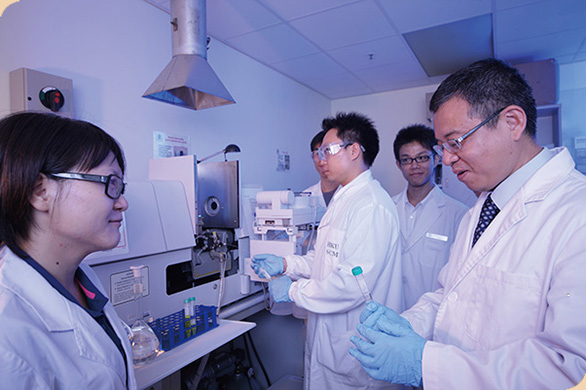 The School of Chinese Medicine uses the technique of atomic absorption spectroscopy to conduct experiments on quantitative determination of heavy metals (arsenic, cadmium, lead and mercury) contained in proprietary Chinese medicines. The School of Chinese Medicine uses the technique of atomic absorption spectroscopy to conduct experiments on quantitative determination of heavy metals (arsenic, cadmium, lead and mercury) contained in proprietary Chinese medicines. |
 The Molecular Chinese Medicine Laboratory adopts a modern pharmacological approach to devise new drugs from Chinese medicine. The above photo shows fractions of herbal extract in the laboratory. The Molecular Chinese Medicine Laboratory adopts a modern pharmacological approach to devise new drugs from Chinese medicine. The above photo shows fractions of herbal extract in the laboratory. |
| Next |